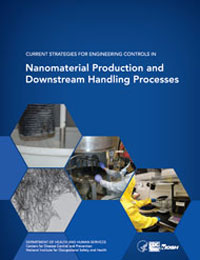| Nov 09, 2013 | |
NIOSH issues new recommendations for controlling workers' exposure to nanomaterials |
|
| (Nanowerk News) The National Institute for Occupational Safety and Health (NIOSH) issued new recommendations on Nov. 8 for controlling worker exposures to engineered nanomaterials during the manufacture and industrial use of those materials. The recommendations are based on technologies now applied in the various industries that use nanomaterials, and on control methods that have been shown to be effective in reducing occupational exposures in other industries. | |
 The recommendations are contained in a new document "Current Strategies for Engineering Controls in Nanomaterial Production and Downstream Handling Processes", DHHS (NIOSH) Publication No. 2014-102. "As we continue to work with diverse partners to study the health effects produced by exposure to nanomaterials, particularly as new materials and products continue to be introduced, it is prudent to protect workers now from potential adverse health outcomes," said NIOSH Director John Howard, M.D. "These recommendations represent the kind of science-based guidance that our partners have requested, as a vital component for supporting the safe growth of nanotechnology and U.S. leadership in the global market." Engineering controls are favored over administrative controls and personal protective equipment for lowering worker exposures, because they are designed to remove the hazard at the source, before it comes into contact with the worker. However, evidence showing the effectiveness of controls during the manufacture and downstream use of engineered nanomaterials in specific applications has been scarce. The NIOSH recommendations fill a gap for science-based guidance that employers and workers can apply now, as research continues for better understanding of nanomaterial characteristics, and ways in which workers may be exposed, that may pose the risk of adverse health effects. |
|
| The consumer products market currently has more than 1,000 nanomaterial-containing products including makeup, sunscreen, food storage products, appliances, clothing, electronics, computers, sporting goods, and coatings. As more nanomaterials are introduced into the workplace and nano-enabled products enter the market, it is essential that producers and users of engineered nanomaterials ensure a safe and healthy work environment, the new document states. | |
| Processes discussed in the document and for which controls are recommended and described include reactor operations and cleanout processes, small-scale weighing and handling of nanopowders, intermediate and finishing processes, and maintenance tasks. The document also includes recommendations for evaluating the performance of control technologies and control systems. | |
| NIOSH is the federal agency that conducts research and makes recommendations to prevent work-related injuries, illnesses, and deaths. It conducts an extensive and multi-faceted research program with partners to better understand the occupational health and safety implications of nanotechnology, publish research findings, and disseminate occupational health and safety recommendations widely, based on peer-reviewed science. |
| Source: NIOSH |
